
There are two approved deep seaport projects that the Federal Government is considering investing approximately $7.2bn in across the country.
These projects include the Ibom, Badagry, and Deep Seaports.
In December 2020, the Akwa Ibom State Government announced that the Federal Government had given the green light for the first phase of the Ibom Deep Seaport, with an estimated total cost of $4.6bn, of which $2.016bn was approved.
This information was shared in Uyo by Akan Okon, who was the Akwa-Ibom State Commissioner for Economic Development and IDSP at the time.
Okon stated that the Federal Executive Council had sanctioned the commencement of the initial phase of IDSP on December 16, 2020. He added that the seaport would address unemployment challenges in Akwa Ibom and enable the state to introduce initiatives for job creation and poverty alleviation.
Upon completion, the project is expected to create over 300,000 jobs in Akwa Ibom, according to Okon.
“Akwa Ibom will be transformed industrially by this project, as it will help tackle crucial issues in the state, especially unemployment, and boost the state’s economy significantly. The total construction cost of the Ibom Deep Seaport is $4.6bn, with the first phase approved at $2.016bn by the Federal Government on Wednesday, December 16,” remarked Okon.
On March 1, 2022, Governor Babajide Sanwo-Olu of Lagos State disclosed that the Badagry Deep Seaport project, estimated at $2.59bn and set to become one of Africa’s largest, would commence in June.
This announcement was made in Badagry during a stakeholders’ meeting on the Badagry Deep Seaport and Free Zone Project.
The decision to begin construction of the seaport, which would involve 12 communities in Badagry, came after a decade since the idea was conceived in 2012 during the tenure of former Governor Babatunde Fashola.
Sanwo-Olu emphasized that the Badagry Deep Seaport Project presents vast opportunities for progress for all residents of the state, given the anticipated increase in trade and investment once the project is operational.
“Of utmost importance is prioritizing employment and skill development for the youth and women in the affected communities. When fully operational, it will not only benefit the people of Badagry but also revolutionize the economy of our state and the entire West African sub-region,” he stated.
However, stakeholders have expressed concerns about the significant implications of the delayed projects, voicing their frustrations over the lack of progress.
Captain Tajudeen Alao, President of the National Association of Master Mariners, emphasized that the focus should be on developing smart ports rather than numerous deep seaports.
He suggested the establishment of a few deep seaports and using feeder vessels to other ports.
“We need to reconsider the scale of our import and export activities to avoid redundant ports like Sapele, Koko, and Calabar,” he explained.
Alao stressed the importance of implementing integrated evacuation logistics through rail, road, and barges, alongside ensuring consistent security measures.
“It is imperative to formulate a transport policy with short-, medium-, and long-term strategies,” he argued.
Captain Adewale Ishola, a master mariner, remarked, “Extensive feasibility studies have been conducted, with the NPA also endorsing their plans. Projects of this nature require substantial capital. Lack of seriousness on the part of the authorities may deter investor interest in these projects.”
According to Captain Ogunshakin Rotimi-William, these projects require considerable funding. At present, the Federal Government is juggling multiple projects simultaneously.
“The deep seaports are crucial as some vessels cannot navigate certain waters due to depth limitations. Establishing these seaports will not only create more jobs for smaller vessels and seafarers but also address issues like finance and political interests causing delays in the projects,” he explained.
